A TATB tribute to the 1985 Los Angeles Clippers
Yes, seriously.
What the bleepity-bleep is the justification for this on an alleged Boston sports site, you ask? Fair question, I suppose.
Could be because the Clippers' astounding emergence as a Western Conference playoff force has me longing for the days before they became the trend of the moment for every D-List Hollywood celebrity, fame-hungry wannabe and "Malcolm in the Middle" castmate.
Could be because I'm permanently stuck in an '80s NBA time warp, having spent way too many daytime hours absorbing those Dan Patrick-hosted "NBA's Greatest Games" on ESPN2. (My favorite is the one where Isiah Thomas, after watching footage from Game 6 of the '88 Finals, begins crying, explaining to Patrick, "You just can't understand . . . you just (sniffle). . . you just can't understand." Which, coincidentally, is the exact same way he explains most of his decisions to Larry Brown.)
Or it could because I need something quirky and comforting to take my mind off the bizarre "Good Times" episode my remote inexplicably stalled on tonight in which Penny's mother cornered her and burned her with an iron. Man, no wonder Janet Jackson is so messed up.
But the truest reason? This: I found this Clippers card set while cleaning out my old desk a few weeks back and got such a kick out of it that I thought you might too. You can find the relevant info on the '85 Clips here. The irrelevant info . . . well, you're in the right place. Let's go . . .
 Bridgeman, along with Dave Meyers and Brian Winters, were the three magic beans the Lakers paid the Bucks for a giant named Kareem Abdul-Jabbar prior to the '76-'77 season. Actually, despite the sheer ridiculousness of that deal (was a young Rick Pitino the Bucks' GM?), the previous snarkiness was probably unfair to Bridgeman, a smoother version of Vinnie Johnson who provided instant offense while averaging double figures in scoring eight times for some outstanding Bucks teams. Bridgeman remains one of the most Milwaukee's most popular former athletes, having returned to the city and the team after his sentence with the Clippers was completed, and he's currently a successful businessman whose holdings include a pair of Wendy's franchises. In other words, not only can he brag that he was traded for one of the great players in NBA history, but he can have a Frosty on the house any damn time he pleases. Sounds like a well-lived life to us.
Bridgeman, along with Dave Meyers and Brian Winters, were the three magic beans the Lakers paid the Bucks for a giant named Kareem Abdul-Jabbar prior to the '76-'77 season. Actually, despite the sheer ridiculousness of that deal (was a young Rick Pitino the Bucks' GM?), the previous snarkiness was probably unfair to Bridgeman, a smoother version of Vinnie Johnson who provided instant offense while averaging double figures in scoring eight times for some outstanding Bucks teams. Bridgeman remains one of the most Milwaukee's most popular former athletes, having returned to the city and the team after his sentence with the Clippers was completed, and he's currently a successful businessman whose holdings include a pair of Wendy's franchises. In other words, not only can he brag that he was traded for one of the great players in NBA history, but he can have a Frosty on the house any damn time he pleases. Sounds like a well-lived life to us. 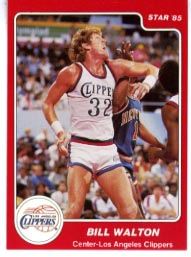
I admire Bill Walton for many reasons - for mastering the game at its purest form, for shooting an astounding 21-for-22 in an NCAA final, for overcoming his childhood stuttering problem, for adding new meaning to the Blazers' nickname in his hippie-tastic '70s, for giving the '85-'86 Celtics the most talented, selfless backup center in hoop history, for calling out Larry Johnson as "a DESPICABLE human being" during an NBA Finals broadcast. But mostly, I'll forever dig Walton because of a first-hand experience that confirmed he's as down-to-earth and jovial as the perception. It took place during my sophomore year at UMaine. I had just begun working at the Maine Campus, the student newspaper, and I was assigned to cover an on-campus speech Walton was making regarding some topic that escapes me now, though I recall it had nothing to do with basketball - in fact, the media was forewarned he wouldn't be answering questions about his hoop career. Well, you know me. I couldn't help it. After the speech, he casually met backstage with the three or four reporters. Eventually, I got up the nerve to stammer a question about the '86 Celtics. I'm sure it came out sounding like Chris Farley's awestruck "interview" with Paul McCartney on Saturday Night Live: "You were in the Beatles . . . (awkward pause) . . . that was awesome." I cringed, awaiting for a terse reply, a scowl, an admonishment. Instead, Walton's face brightened, and while this isn't an exact quote of his answer, it is how my memory chooses to remember it: "Well, young man, let me tell you about the 1986 Boston Celtics. Not only was that the most WONDERFUL experience I've ever had playing the game of basketball, but it was also a WONDERFUL experience just basking in the camaraderie of that locker room every single day. What a time it was to be a Celtic. Before the game, McHale would be in one corner, reading the newspaper and cracking jokes. Ainge would be pestering him, calling him Frankenstein and just being a nuisance like only Danny Ainge could be. You'd have the Chief reading his love-letters aloud in that booming voice, and DJ would be sitting in front of his locker eating a bag of McDonald's. And right before it was time to play, K.C. would be at the chalkboard, trying to draw up a play, and Larry would interrupt him, shake his head and say, 'Chief, you win the tip, I'll hit a (expletive) three, and we'll never trail.' Young fella, let me tell you, it was a wonderful, WONDERFUL time to be a Boston Celtic."
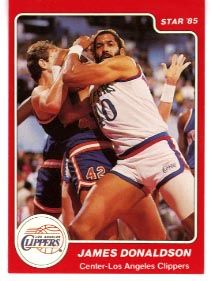
"LOOK AT THE UNIT ON THAT GUY!!" (Seriously, it's a minor miracle that we did not come to learn the phrase "wardrobe malfunction" during the NBA's inexplicable Tiny-Shorts-On-Giant-Dudes era, which means pretty much anything pre-dating Air Jordan, the Fab Five, and the Baggy Shorts Revolution. On behalf the American viewing public, Shaquille O'Neal thanks you.)
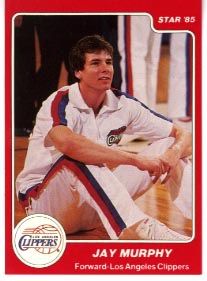
Murphy was a standout at Boston College during the Michael Adams/John Bagley years, where he also managed to be the central figure in one of the Eagles' 3,294 basketball scandals over the past few decades. Google wasn't of much help - maybe I should give Ted Sarandis a call - but I recall it being something about him attending night school instead of taking classes with the smahhht kids. In light of a Heisman Trophy-winning QB milking a fifth year of eligibility by taking a single ballroom dancing course, it doesn't seem so scandalous by current standards. Either way, Murphy shot 16 percent (yes, sixteen - 8 for 50 for you bricklayers out there) for the '85 Clips, and after a tour in Europe, we're assuming he eventually fell back on that BC Night School degree.
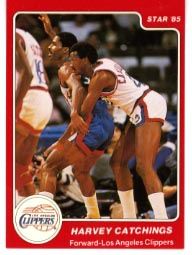
Ummmm . . . he's the father of University of Tennessee and WNBA star Tamika Catchings. How about that for an interesting tidbit? No? Okay, I guess you can call him nondescript, then. At least he wasn't Granville Waiters.

How a generic newspaper caption of this photo might read: The Clippers' Bryan Warrick, half-man, half-bat, rips the jugular vein out of the neck of the Nets' Wayne Sappleton during the Clippers' bloody 112-88 victory last night in Los Angeles. Warrick was called for a foul. New Jersey's Mike O'Koren (left) looks on.
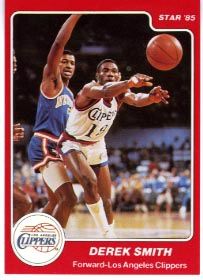 Poor Derek Smith. Every time he had a triumph, it was trumped by tragedy. After averaging over 22 ppg at age 23 and earning a reputation as a ballhawking demon on the defensive end, his career was permanently altered when he blew out his knee nine games into the '85-'86 season. While he came back and carved out as a useful, willing, but fragile role player, his knees only got worse, and after a stellar, bittersweet cameo with the Celtics in the '91 playoffs, he was forced to retire at 29. Such a star-crossed career might have left a lesser man bitter, but the affable, popular Smith never lost his passion for the game, and by '96 he was a well-regarded young assistant coach for the Washington Bullets. Then came the worst tragedy imaginable. On a team cruise prior to the start of the '96-'97 season, Smith suffered a fatal heart attack. He was 34 years old. In the final sad irony, the autopsy revealed he had lived his entire life with an abnormally large heart. (Footnote: I keep a file in my desk of sports articles that have meant something to me or affected me in some way - Gary Smith's SI masterpiece on the Indians' spring training tragedy, Steve Buckley's wrapup of the Maine Guides' season in '84, my hometown paper the day Len Bias died, stuff such as that. This column on Smith's death, written by Michael Wilbon in Aug. '96, forever has a secure place in my file. I can't give it a higher recommendation.)
Poor Derek Smith. Every time he had a triumph, it was trumped by tragedy. After averaging over 22 ppg at age 23 and earning a reputation as a ballhawking demon on the defensive end, his career was permanently altered when he blew out his knee nine games into the '85-'86 season. While he came back and carved out as a useful, willing, but fragile role player, his knees only got worse, and after a stellar, bittersweet cameo with the Celtics in the '91 playoffs, he was forced to retire at 29. Such a star-crossed career might have left a lesser man bitter, but the affable, popular Smith never lost his passion for the game, and by '96 he was a well-regarded young assistant coach for the Washington Bullets. Then came the worst tragedy imaginable. On a team cruise prior to the start of the '96-'97 season, Smith suffered a fatal heart attack. He was 34 years old. In the final sad irony, the autopsy revealed he had lived his entire life with an abnormally large heart. (Footnote: I keep a file in my desk of sports articles that have meant something to me or affected me in some way - Gary Smith's SI masterpiece on the Indians' spring training tragedy, Steve Buckley's wrapup of the Maine Guides' season in '84, my hometown paper the day Len Bias died, stuff such as that. This column on Smith's death, written by Michael Wilbon in Aug. '96, forever has a secure place in my file. I can't give it a higher recommendation.) 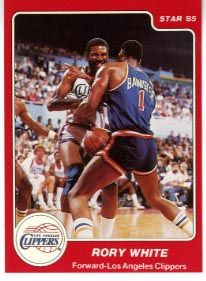
Not really sure what is happening here, but A) The Knicks' Ken Bannister was widely considered the ugliest player in the league, thus the nickname "The Animal"; B) our man Rory White looks like he's suffering an acute, very specific pain; and C) sometimes being a regulation NBA basketball is not all it's cracked up to be. Draw your own conclusions.
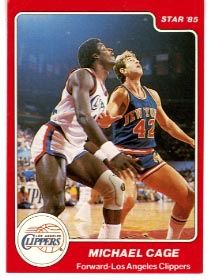
You probably remember Michael Cage. He was a beast of a rebounder, sort of the Ben Wallace of his time, and he carved out a very respectable 15-year NBA career. But that's not what you remember him for, is it? No, of course it isn't. You remember Michael Cage for the Jheri Curl, that magnificent Hazelwood-in-Alaska-slicked mane that undoubtedly was the inspiration for the Eriq LaSalle character in "Coming to America," if not a certain young Dominican boy daydreaming beneath a mango tree. What a legacy. What a legacy. Michael Cage, you let your soul glo despite the fire marshal's warning, and for that we salute you.

The 1984 NBA Draft is regarded as the deepest in league history, and with good reason. (H)Akeem Olajuwon went first, Michael Jordan third, Charles Barkley fifth and solid pros Otis Thorpe, Kevin Willis, Sam Perkins and Alvin Robertson all were chosen in the first 15 picks. So whom did the LA Clippers select with the 8th overall pick in the first round? Yup, our guy Lancaster here, despite the fact that he was a tweener who averaged just 12 ppg in his career at Louisville. The pick was panned as questionable at the time, and the Clippers attempted to justify it by claiming they needed depth at guard and Gordon could play the point in a pinch. Which might have been a reasonable argument, we suppose, had the Utah Jazz not selected some kid from Gonzaga named Stockton eight picks later.
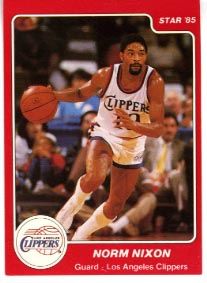
Nixon has the dubious distinction of being the only player in NBA history who couldn't stand playing with Magic Johnson. Perhaps the quickest guard of his time (though Randy Smith and Rickey Green might disagree), Nixon had been immensely popular in L.A. - he embraced the Hollywood lifestyle and married "Fame" star Debbie Allen - and he believed his name belonged in lights. He struggled - or perhaps refused - to control his ego despite the Lakers' on-court success, becoming more jealous with every Magic star turn. Fed up with the divisiveness, the Lakers sent Nixon and Eddie Jordan to the Clippers in exchange for center Swen Nater and the draft rights to guard Byron Scott in the summer of '83. Lakers fans initially hated the trade - Jack Nicholson took to wearing black to home games as a way of protest - but Scott eventually thrived as the sweet-shooting complement to Magic on three championship teams, while knee injuries robbed Nixon of his speed, and sooner rather than later, his skill. He spent nearly two full seasons on the injured list, and retired after the '88-'89 season. Not sure what became of Magic Johnson.
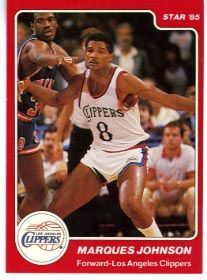 My old man's your typical stoic Mainer, more prone to reluctant, prove-it-to-me-then-prove-it-again praise than to hyperbole. So when he came home from a Bucks-Celtics game during Johnson's rookie year with Milwaukee and declared, "Marques Johnson is the best basketball player I've ever seen," well, apparently that's the kind of thing that sticks in an 8-year-old budding sports nut's mind until he's 36. Twenty years after his career ended, Johnson isn't cracking anyone's Top 50 All-Time players list - except for possibly my stubborn ol' dad's - but he was an accomplished pro nonetheless, a five-time All-Star who was as smooth offensively as any player of his era not nicknamed the Iceman. Naturally, his better days came pre-Clipper. Johnson's career ended abruptly in 1986 when he ran headfirst into behemoth teammate Benoit Benjamin's bloated gut - you just can't make something like that up - and suffered a neck injury. Running into obese teammates - such was the danger of Clipperdom in the '80s. (IMDB note: Johnson had a small role in the classic "White Men Can't Jump," playing Raymond, a dim-bulb of a hoopster who attempts, with much comedy and little success, to rob a familiar convenience store after losing a high-stakes pickup game. Don't know if Johnson ever took acting seriously, but he was certainly convincing as a laughably deranged basketball player. Probably not much of a stretch after the Clipper Experience, huh?)
My old man's your typical stoic Mainer, more prone to reluctant, prove-it-to-me-then-prove-it-again praise than to hyperbole. So when he came home from a Bucks-Celtics game during Johnson's rookie year with Milwaukee and declared, "Marques Johnson is the best basketball player I've ever seen," well, apparently that's the kind of thing that sticks in an 8-year-old budding sports nut's mind until he's 36. Twenty years after his career ended, Johnson isn't cracking anyone's Top 50 All-Time players list - except for possibly my stubborn ol' dad's - but he was an accomplished pro nonetheless, a five-time All-Star who was as smooth offensively as any player of his era not nicknamed the Iceman. Naturally, his better days came pre-Clipper. Johnson's career ended abruptly in 1986 when he ran headfirst into behemoth teammate Benoit Benjamin's bloated gut - you just can't make something like that up - and suffered a neck injury. Running into obese teammates - such was the danger of Clipperdom in the '80s. (IMDB note: Johnson had a small role in the classic "White Men Can't Jump," playing Raymond, a dim-bulb of a hoopster who attempts, with much comedy and little success, to rob a familiar convenience store after losing a high-stakes pickup game. Don't know if Johnson ever took acting seriously, but he was certainly convincing as a laughably deranged basketball player. Probably not much of a stretch after the Clipper Experience, huh?)

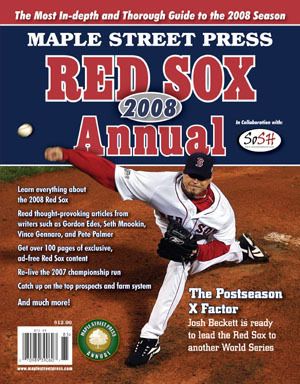
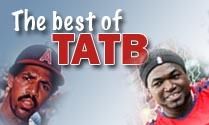









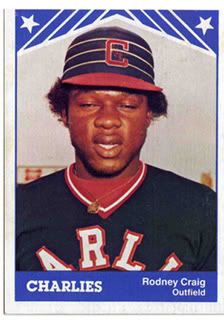
|
<< Home